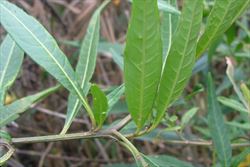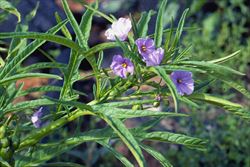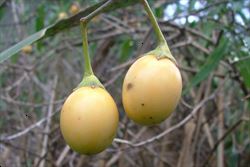Click on images to enlarge

habit (Photo: Sheldon Navie)

habit in fruit (Photo: Sheldon Navie)

entire leaves (Photo: Sheldon Navie)

close-up of leaves and leaf undersides (Photo: Sheldon Navie)

deeply-lobed leaves and flowers with notched petals (Photo: Greg Jordan)

close-up of immature fruit (Photo: Sheldon Navie)

close-up of pale orange-yellow mature fruit (Photo: Sheldon Navie)

the similar Solanum vescum, with longer and narrower leaves (Photo: Greg Jordan)
Scientific Name
Solanum laciniatum Aiton
Synonyms
Solanum aviculare Aiton var. laciniatum (Aiton) DominSolanum laciniatum Aiton forma australiense Geras.Solanum laciniatum Aiton forma cultum Geras.Solanum laciniatum Aiton forma laciniatumSolanum laciniatum Aiton forma novazealandicum Geras.Solanum laciniatum Aiton forma tasmanicum Geras.Solanum laciniatum Aiton forma viridicaule Geras.Solanum laciniatum Aiton var. fruticosum Salisb.Solanum laciniatum Aiton var. herbaceum SweetSolanum pinnatifidum Lam.Solanum pinnatifolium Salisb.Solanum reclinatum L'Her. ex Pers.
Family
Solanaceae
Common Names
cut-leaf kangaroo apple, cut-leaf kangaroo-apple, kangaroo apple, kangaroo-apple, large kangaroo apple, large kangaroo-apple, large-flowered kangaroo apple, poroporo
Origin
Native to south-eastern Australia (i.e. some parts of eastern New South Wales, the ACT, Victoria, Tasmania and some parts of south-eastern South Australia) and New Zealand.
Naturalised Distribution
Naturalised in the coastal districts of south-western and western Western Australia and occasionally naturalised beyond its native range in some parts of south-eastern South Australia (including on Kangaroo Island).
Notes
Large kangaroo apple (Solanum laciniatum) is regarded as an environmental weed in Western Australia.

